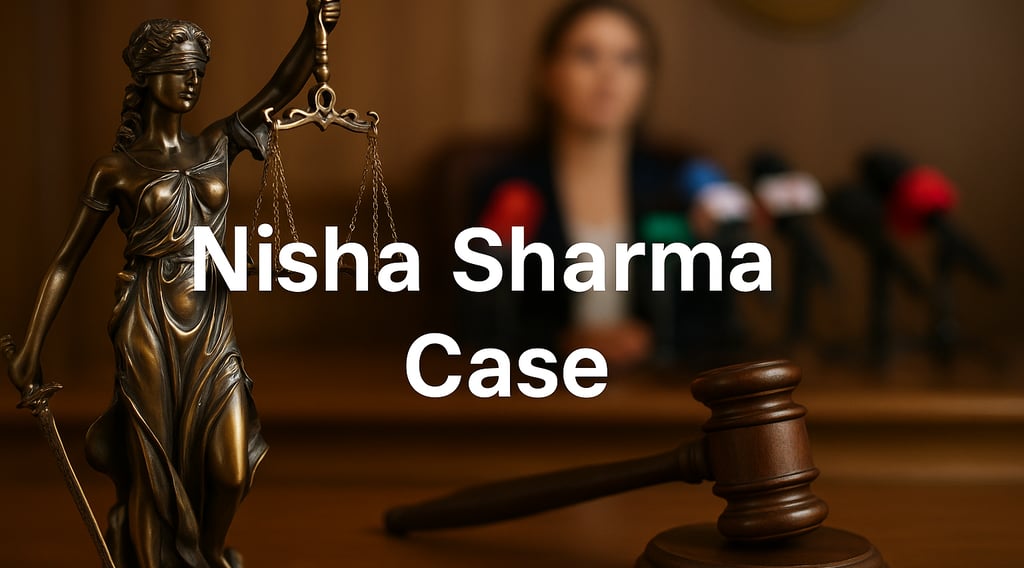Beti Bohot Bacha Liya, Ab Beta Bachao: The Nisha Sharma Case
SD
5/8/20254 min read


Beti Bohot Bacha Liya, Ab Beta Bachao: A Reassessment of Gender Justice in India
In the last few decades, India has seen powerful movements aimed at addressing gender inequality and protecting the rights of women. Campaigns like Beti Bachao, Beti Padhao have rightfully brought attention to deep-rooted societal issues such as female infanticide, education gaps, and gender discrimination. However, in the process of aggressively advocating for women’s rights, the conversation around legal fairness and gender neutrality has largely been absent.
A growing sentiment now emerging across legal and social circles is expressed through the powerful slogan:
“Beti bohot bacha liya, ab beta bachao” — “We’ve done a lot to save daughters; now it’s time to save sons.”
This is not a rejection of feminism or gender equity, but a response to the increasing misuse of gender-based laws, especially in dowry and domestic violence cases. One of the most significant examples that encapsulates this issue is the Nisha Sharma dowry case.
The Nisha Sharma Dowry Case: A Story Revisited
The Nisha Sharma dowry case, which initially drew praise and later sparked controversy, remains one of India’s most debated legal episodes Wikipedia.
In 2003, Nisha Sharma, a young woman from Noida, became a national hero overnight. Just hours before her wedding, she made headlines by calling off the ceremony and lodging a police complaint against her fiancé, Munish Dalal, and his family, accusing them of making last-minute dowry demands.
She claimed that Dalal’s family had asked for a car and additional cash just before the ceremony. Her brave stance against the alleged dowry demand turned her into a symbol of female empowerment. Media across the country praised her, politicians lauded her courage, and she became a case study in schools as an icon of modern womanhood.
But as the case moved through the judicial system, the narrative began to unravel.
The Turn of Events
Nearly a decade later, during trial proceedings, several revelations came to light:
There was no conclusive evidence of a dowry demand made by Munish Dalal or his family.
Investigations indicated that Nisha Sharma had a previous romantic involvement with another man, which her family disapproved of.
Allegations arose suggesting that the dowry charge was a fabricated strategy to avoid the marriage and cover up the prior relationship.
In 2012, the court acquitted all the accused, stating there was no credible proof to support the dowry demand claim. The verdict cited misuse of legal provisions and lack of intent to commit any crime.
The damage, however, had already been done. Munish Dalal, who once held a respectable job in the US, had to return to India and fight a long-drawn battle to restore his dignity. His career, reputation, and emotional well-being were irreparably affected.
Legal Protections or Legal Weapons?
Laws such as Section 498A of the Indian Penal Code, which criminalizes cruelty against a woman by her husband or in-laws, were instituted to protect women from domestic abuse and dowry harassment. While these laws were critical in addressing the brutal realities of patriarchy, over time, there have been growing reports of misuse.
According to National Crime Records Bureau (NCRB) data:
A large percentage of cases filed under Section 498A end in acquittal.
In many instances, courts have observed that these provisions were used for settling personal scores, exerting pressure for property or alimony, or harassing spouses and their families.
Judiciary and law commissions have repeatedly acknowledged this issue, emphasizing the need for safeguards against the weaponization of gender-specific laws.
The Essence of the Slogan: “Beti Bohot Bacha Liya, Ab Beta Bachao”
This slogan is not an attack on women’s rights. It’s a plea for balanced justice. It recognizes that men too can be victims of false allegations, defamation, and legal harassment. It challenges the presumption that women are always the victims and men are always the oppressors.
This shift in narrative calls for:
Gender-neutral domestic laws that consider facts, not assumptions.
Stringent punishment for proven false allegations.
Mental health and social rehabilitation support for falsely accused individuals.
Restoration of dignity and legal recourse for victims of misuse.
Why Legal Reform is Necessary
Several courts in India have acknowledged the problem and have issued guidelines:
The Supreme Court has advised against immediate arrests under Section 498A without prior investigation.
Family Welfare Committees were proposed to screen complaints before registration of FIRs.
Recommendations have been made to make the provision compoundable, allowing out-of-court settlements in less serious cases.
Despite these steps, there is still no comprehensive legislative action to protect men and their families from false criminal charges.
The Societal Impact of False Allegations
False allegations don’t just affect the accused — they also:
Undermine genuine victims’ credibility.
Cause irreversible reputational damage to innocent families.
Encourage legal and emotional blackmail in marital disputes.
Destroy trust in the legal system.
Justice cannot be gender-biased. In a democratic society, the truth must be the only standard of guilt or innocence.
Conclusion
The journey toward gender equality cannot be one-sided. India must move from protectionism to fairness, from bias to balance, and from fear to accountability.
The slogan “Beti bohot bacha liya, ab beta bachao” is not a dismissal of women’s rights. It is a demand for equality before the law, where both daughters and sons are protected from injustice — not by default, but by evidence.
As society evolves, so must our laws, our social attitudes, and our commitment to truth. We cannot allow the pendulum of justice to swing blindly. It must rest at the center — in equity, integrity, and reason.

About One Solution
Quick Links
Contact Info
One Solution — Your trusted partner for financial success.
📍 F17, Grand Plaza, Paltan Bazar
Guwahati, Kamrup (M), Assam
India, Pin: 781008
📞 9650072280
© 2025 One Solution. All Rights Reserved.
